#Istanbul Convention
Explore tagged Tumblr posts
Text
Femicide in Turkey
Femicide: The killing of women and girls because of their gender.
On October 4, saturday a 19 year old boy called Semih Çelik brutally murdered two 19 year old girls, Ayşenur Halil and İkbal Uzuner with a gap of 30 minutes. Semih Çelik had been assaulting İkbal Uzuner since she was in high school. Because of this she was homeschooled. They had reported him to the police several times. The police did nothing as always. He got away with this during the day, in a crowded street. He had filmed a video a few days before the murder, saying he was planning to murder her and then kill himself but that God protected her and he changed his mind last minute. This would be prevented if the police cared enough to not let him be out in the streets. However many people like this live among us every day.
This is how normalized it is. This is how much he knows no one will protect her. This is the danger we face every single day. 3 more women were murdered after the incident as I'm writing this.
Here's a link to The Monument Counter. It has an explanation in English. Here you can see the names and numbers of every murdered woman in Turkey recorded. You can click on the years to highlight their names and see the number of how many were murdered.
It is vital for Turkish women to be heard internationally, quite literally, and hopefully this will better the lives of women abroad as well.
I will talk about the details of the murder below. However it is very brutal and graphic. I am warning you. Her mother said "I wish he shot her instead, it must've hurt so much.'
He tore her body into pieces, dragged her dead body and THREW HER SEVERED HEAD IN FRONT OF HER MOTHER down the gates. And then he hung himself off the building.
#feminism#turkishwomenareindanger#turkishwomenneedhelp#femicide#womanism#feminist#womanist#turkish women are in danger#turkish women need help#shit I need to add more hashtags later#istanbul convention keeps alive#istanbul convention
26 notes
·
View notes
Text
In the first three months of this year, 11 women were killed in Switzerland, twice as many as in the same period last year, Brava wrote. Meanwhile, the implementation of the Istanbul Convention, which Switzerland ratified in 2018, remains inadequate, the petitioners criticised."
Campaigners in Switzerland are demanding CHF350 million ($395 million) for the safety of women from violence. A petition was submitted to the Federal Chancellery in Bern on Monday with over 21,400 signatures.
March 25, 2025
The petition demands that the government finally allocate sufficient resources to combat gender-based violence. The money should be used for better protection against violence, consistent prosecution and prevention, it says.
More than 90 NGOs, specialist organisations, collectives, trade unions and political parties are behind the petition, as Brava – formerly Terre des Femmes – wrote when the petition was handed in.
In the first three months of this year, 11 women were killed in Switzerland, twice as many as in the same period last year, Brava wrote. Meanwhile, the implementation of the Istanbul Convention, which Switzerland ratified in 2018, remains inadequate, the petitioners criticised.
Women’s shelters have too little money, they added. There are too few counselling services and the political measures are also inadequate. Women need to be heard, protected and taken seriously. Gender-based violence is an emergency for society as a whole.
Over the next few years, the federal government wants to take action against gender-based violence and focus on combating the causes, further training and protection against sexualised violence. “Substantial progress is to be made by 2026”, Interior Minister Elisabeth Baume-Schneider said in November.
At that time, it was also announced that a free, centralised emergency number for victims of violence that is available around the clock is expected to go into operation from November 2025.
#switzerland#male violence#violence against women#Brava#Terre des femmes#Istanbul convention#Femicide#The Swiss government is promising a free 24 hour holiness for women experiencing violence. Hold them to that promise
4 notes
·
View notes
Text
What a beautiful place.
Basilica Cistern, Istanbul, Turkey built in the year 532 during the reign of Justinian I. It supplied the city with water and is approx. 9800 m² of surface. It is capable of holding between 80,000 and 100,000 m³ of water.
#recently learned british people only think of cisterns as the tank on the back of a toilet#which has unfortunately made me rethink some naming conventions for my fantasy novel#but i don't know what else to call it if not a cistern#writing#photography#culture#ancient buildings#turkey#museum#ancient cultures#Basilica Cistern Istanbul#built 532
1K notes
·
View notes
Text
hello
this post will be way different than my usual content but i feel obliged to raise my voice in this matter.
This might be triggering for some people and i'm sorry in advance but please read the whole thing and help me raise my voice and the women of my country's to make this matter known so that the government would start taking us seriously and start taking measures for women's safety.
I live in Turkey and i love my country but i cannot deny the fact that as each day passes i become more scared for my life, just like the rest of the women in my country. I'm writing these as the women are protesting yesterday's murders right now.
Yesterday, 2 women were brutally murdered by the same man at Edirnekapı, Istanbul. The murderer first killed Ayşenur (19) in his home and called the cops to report the murder then, he went to kill İkbal (19). Semih Çelik murdered those two 19 YEAR OLD girls, İkbal Uzuner and Ayşenur Halil. He slit Ayşenur's throat and dismembered İkbal Uzuner on top of the city walls and he THREW İKBAL'S HEAD IN FRONT OF HER MOTHER. He then committed suicide by jumping from the very same place he dismembered İkbal. And he did all this IN BROAD DAYLIGHT.
He had been stalking İkbal for over a year, his own father had reported him several times, a disturbing drawing made by him and a video of him filmed last year talking about how he wanted to kill İkbal (quoting the exact words from the video: "...The day you saw me, I had come to kill you. I wanted to take a life with me when I left this life, and it was more valuable for me if that person was you. To cut out your heart, your eyes…") were uncovered recently but NO MEASURES WERE TAKEN. That psychopath took two innocent lives and the only thing that the government did was to impose a broadcast ban.
So as a woman who is afraid, i am asking you to spread this and to make this known. We, turkish women, hope that making this matter known globally will help us.
Why do we need help to raise our voices?
>In 2021, Turkey became the first and only country to withdraw from the Istanbul Convention, a human rights treaty of the Council of Europe opposing violence against women.
>Women's complaints are not taken seriously, and offenders are repeatedly let go without any consequences. Our prisons are filled to the brim with journalists and political prisoners, however repeat sexual offenders, abusers, p3d0philes and murderers are released.
So this means, even if that murderer did not commit suicide he might've not been punished properly for his crimes.
Please help me make this matter known.
The images below are the details.

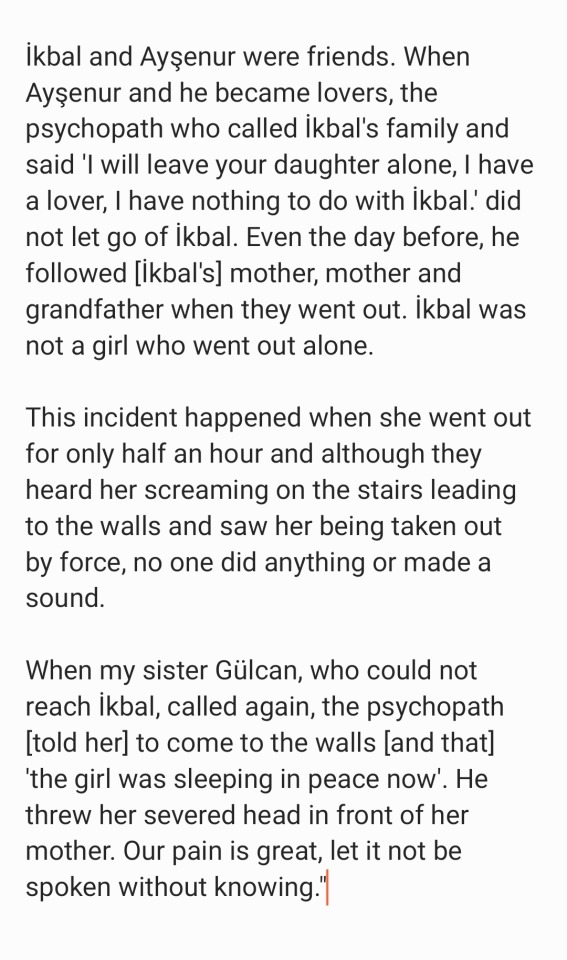


.
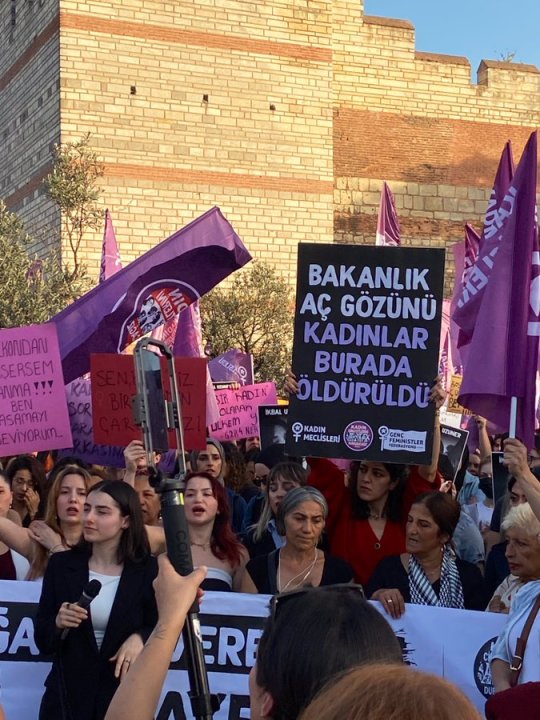
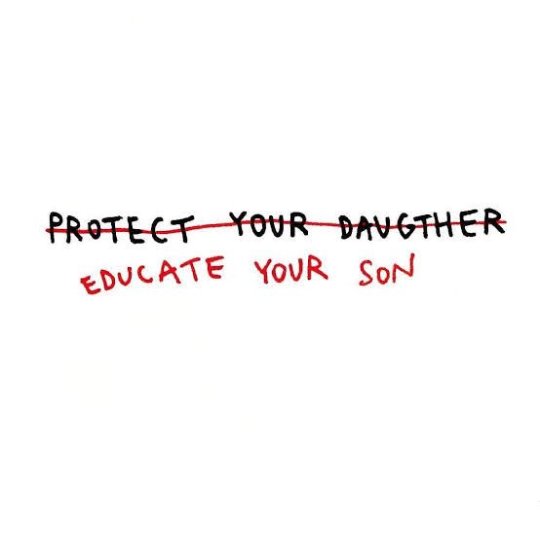
#turkishwomenareindanger#feminism#please help#yaşamak istiyoruz#ikbal uzuner#ayşenur halil#women helping women#foryou#tumblr fyp#fyp#news#world news#news from the world#turkey#turkiye#spread awareness#yaşamakistiyoruz#yasaistiyoruz#istanbul#edirnekapı
419 notes
·
View notes
Photo
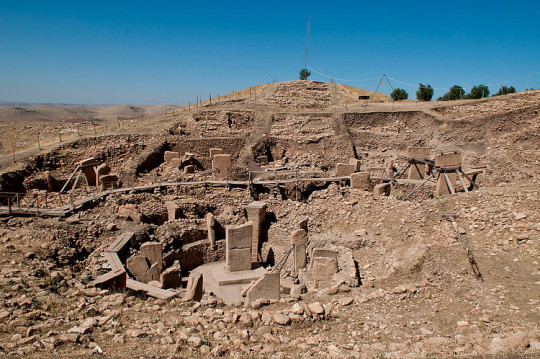
Gobekli Tepe - the World's First Temple?
Located in modern Turkey, Göbekli Tepe is one of the most important archaeological sites in the world. The discovery of this stunning 10,000 year old site in the 1990s CE sent shock waves through the archaeological world and beyond, with some researchers even claiming it was the site of the biblical Garden of Eden. The many examples of sculptures and megalithic architecture which make up what is perhaps the world's earliest temple at Göbekli Tepe predate pottery, metallurgy, the invention of writing, the wheel and the beginning of agriculture. The fact that hunter–gatherer peoples could organize the construction of such a complex site as far back as the 10th or 11th millennium BC not only revolutionizes our understanding of hunter-gatherer culture but poses a serious challenge to the conventional view of the rise of civilization.
A Description of the Göbekli Tepe Site
Göbekli Tepe (Turkish for the 'hill of the navel') is a 1000 foot diameter mound located at the highest point of a mountain ridge, around 9 miles northeast of the town of Şanlıurfa (Urfa) in southeastern Turkey. Since 1994 CE, excavations conducted by Klaus Schmidt of the Istanbul branch of the German Archaeological Institute, with the cooperation of the Şanlıurfa Museum, have been taking place at the site. Results to date have been astounding; especially bearing in mind the excavators estimate that their work has uncovered a mere 5% of the site.
Göbekli Tepe consists of four arrangements of monolithic pillars linked together by segments of coarsely built dry stone walls to form a series of circular or oval structures. There are two large pillars in the center of each complex which are encircled by slightly smaller stones facing inward. Archaeologists believe that these pillars could have once supported roofs. The structures vary in size between around 33 and 98 feet in diameter and have floors made of terrazzo (burnt lime).
Continue reading...
159 notes
·
View notes
Text
An attempt at a Númenorean tughra
Monogram of Elros Tar-Minyatur
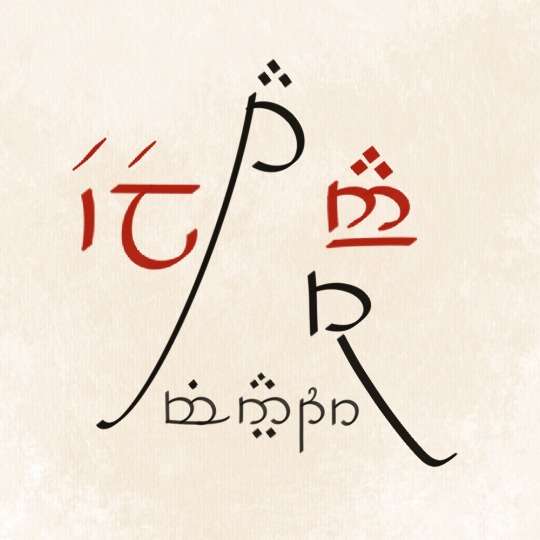
An early monogram, displaying few of the features conventionally associated with later devices, or only in germ. The name of the king is in black (Tar-Minyatur) while 'Elenna' is written in red.
---
Monogram of Tar Vardamir, named Nólimon
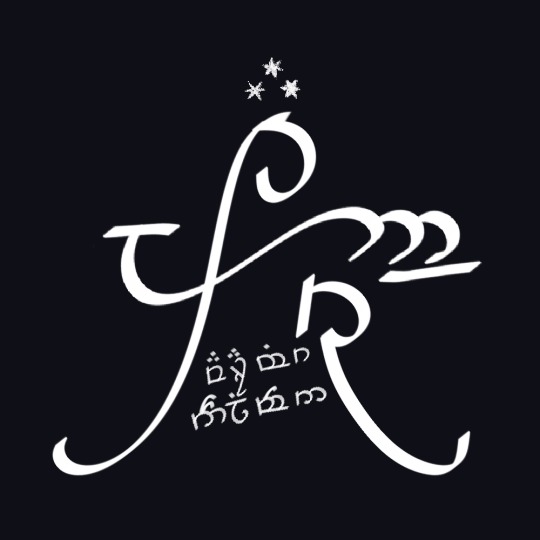
This is certainly an invention of a scribe working long after the death of Vardamir, as the presence of features adopted much later attest - doubtless because the nominal second ruler of Númenor never reigned.
----
Monogram of Tar Amandil
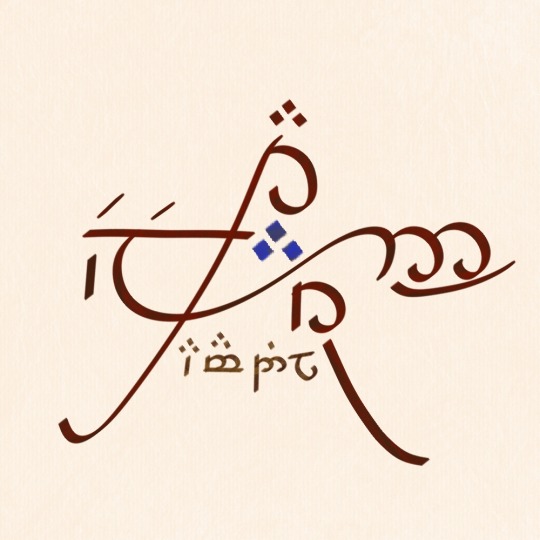
In this monogram, the star shape is more pronounced; the tehta representing the 'a' of 'Elenna' has also been moved to the centre of the device - representing, naturally, the summit of Meneltarma.
---
Monogram of Tar Elendil
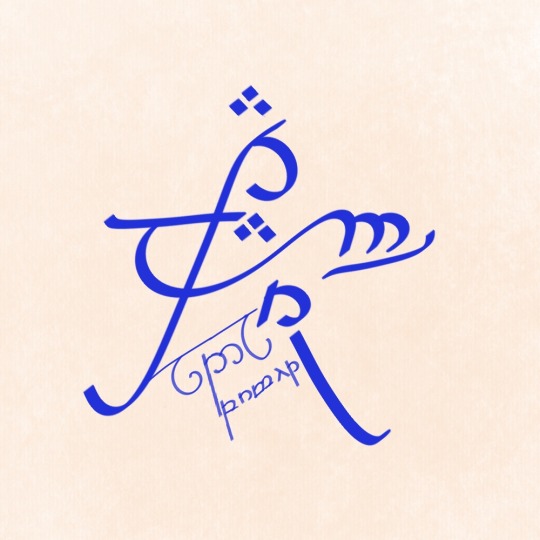
The conventional features are now all present: the star shape is evident, and only the tehtar representing the 'a' in 'Tar' and 'Elenna' have been retained, in symbolic positions, one representing Meneltarma and the other the promontory of Forrostar or, in some interpretations, the stars (clearly the choice made by the scribe who invented the device of Vardamir, perhaps in reverence towards the Valië for whom the king was named).
---
Monogram of Anardil, Tar Aldarion

In this monogram the tehtar are now circumflexes. The king's two names are present, one on land, the other at sea. A ship has been added.
---
Monogram of Tar Ancalimë
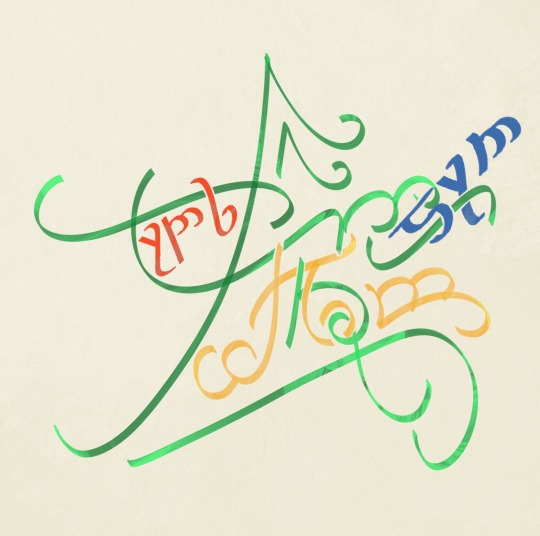
The names of both of the Ruling Queen's parents have been included in this monogram, one that is particularly ornate for the period.
---
explanation: ever since visiting Istanbul a year ago I've been interested in the tughra, a calligraphic monogram used by Ottoman sultans, much as seals were elsewhere (to authentify the sultan's correspondence or official documents), and also on a variety of objects, e.g. here on a wall at Topkapı palace or here on a coin). They started out fairly simple but some ended up being very ornate and gorgeous; and they typically contained the name of the sultan, that of his father, as well as things like epithets and prayers, and also had some conventional features which made them easy to recognise - the beyze (egg), i.e. the loops on the left hand side, and the three tuğ (flagstaff) at the top.
Anyway I've been trying to come up with a Númenorean version and ended up with this, combining some form of the prefix 'Tar' and the name 'Elenna'. As it happens the Ottoman tughra may have had a cartographic element as well - the loops on the left are said to possibly symbolise the two seas - Black Sea, Mediterranean - on whose shores they ruled. Hence the star shape (which I wanted from the start really) and Meneltarma.
I hope I haven't made too many mistakes with the tengwar. I used the classical mode which I've since gathered may not have been the one in use in Númenor or at least not late in Númenor's history... in any case I've taken some wild liberties with the layout anyway, sorry Jirt.
#numenor#tengwar#elros#elros tar minyatur#vardamir#tar amandil#tar elendil#aldarion#tar ancalimë#erendis#worldbuilding
63 notes
·
View notes
Text
You really should know about Storm "Daniel"
Unlike how much all of us Greek blogs notify our tumblr communities about the regular (at this point) arsons wildfires afflicting Greece, we did not say much about the floods the country has been suffering from right now. There was a mention here and there and I even made a joke post as the storm was starting but not a lot of stuff in general. So, I think there's a couple of things you should know and I feel like I could address about it and actually it's not just about Greece. So I believe this could interest a lot of people and it should be something known worldwide.
In the beginning of September there was an alarm about an extreme weather phenomenon forming above the Ionian Sea at the west of mainland Greece. In truth, the phenomenon was not caused by the climate change. It was just a very rare occurence where a high pressure atmosheric system was sandwiched between two currents of low pressure. Low pressure systems are the ones resposible for stormy weather while high pressure systems generally create stable weather. As the low currents encircled the high pressure system, the storm that had started forming became unusually stable for a storm. As a result, the storm moved northeast above Thessaly and other regions of the central part of Greece and... just decided to stay there for an indefinite amount of time. Furthermore, because it's September and the Ionian Sea had warmed up throughout the summer, the medicane (Mediterranean cyclone) gained tropical features as it was forming, pushing its intensity to extremes unknown to this area.
The storm remained above all of central Greece for about 4-5 days but at the meantime it was causing side-storms in neighbouring countries, such as Bulgaria and Turkey. Both countries suffered from floods causing damages and deaths.
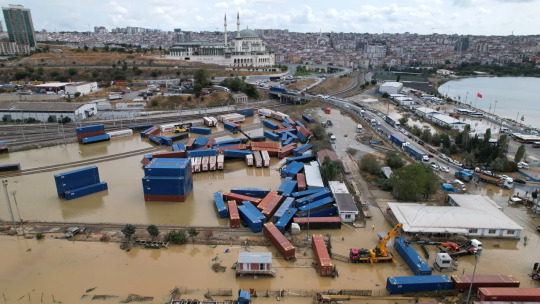
Istanbul, Turkey (CNN).
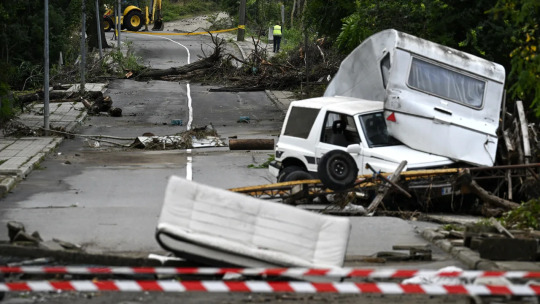
Tsarevo, Bulgaria (CNN).
Four people died in Bulgaria and seven in Turkey.
But like I told you the core of this was exactly on top of Greece's central mainland and islands. So what happened there? I happened to experience this shit first hand. My recollection of it is that it was unlike any other storm I had experienced before. My knowledge on meteorology is not very advanced, however I believe due to the high pressure part, there were actually no winds at all - or they were insignificant, so it wasn't like what you might have in mind as a conventional cyclone. It was a rainstorm but it was like a rainstorm from hell. The crucial part is that in Greece summer violent rainstorms may last for about five minutes but certainly not for five days nonstop. There was no pause, not even for a second. It kept pouring and pouring in indescribable volumes, without decreasing or slowing down, not for a moment. The fourth day it started taking short breaks.
As a person with a phobia of lightnings since childhood, I kept wearing earplugs throughout all these days. For four days, ten seconds did not pass without at least one lightning shrieking exactly on top of our heads. In the end, I am dead serious, I think my lifelong phobia has been cured somewhat due to this extreme exposure that eventually had a numbing effect. I think only the first day there was a record of 7,000 lightnings. I believe there must have been dozens of thousands overall. The lightnings also caused fires but the downpour was so overwhelming no fire could ever stand a chance.
Whether during or after the rains, what I was seeing outside was post-apocalyptic. The only thing missing was the zombies. It really looked like a background from a videogame, including a constantly lit up sky. I was not in danger though people dear to me were. The worst for me was a huge fall in the quality of living but that doesn't matter. The rains caused severe destructions across cities and villages. They caused floods, they broke bridges, they broke a massive number of roads, they made walls collapse, they destroyed springs, they damaged water and electricity outlets entirely, they drowned flocks and flocks of animals, they destroyed mountainous and coastal villages alike, they made cars float and fly over each other and they uprooted houses.

Village in Mount Pelion, Greece.
But that's not the end of it. Four days later, the storm moved southwest towards the Ionian sea, basically to the place of its original formation. It side-swept over Athens in the meantime, flooding the city, but that doesn't mean much since I could cry and Athens would still flood with my tears. Anyway. AFTER the storm left, the floods caused by it started multiplying and expanding. Picture that: a crystal clear sky, a bright sun and your phone screaming state alerts about evacuating your village or town because a lake has launched at you! Here's the thing: Thessaly is a massive plain surrounded by a ring of mountains. Half of those downpours fell right on the lowlands causing floods and destructions the first days. The other half however fell on the mountains, filled the streams heading down and they all met up and filled the lakes and the large river of Thessaly, Pineios and they all basically exploded the next days. Pineios especially exploded both in its western and eastern part, sinking the entirety of Thessaly's plains under water. As a result, floods were actively taking place days after the storm had ended and the weather was good. The phenomena have only started subduing since yesterday.

The overflowing of the river, trapped by the mountains.
Farmers won't be able to work this year and next year is questionable as well. There are huge concerns about various epidemics breaking out as more and more dead animals are found in the waters. Entire villages are under the water. There are estimations that some villages in west Thessaly might have been lost forever and their residents will have to move elsewhere. Sixteen people have died from the rainstorm and the floods.

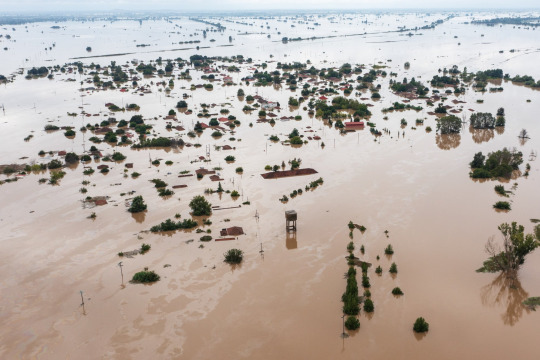
Actual villages in Karditsa, Greece.
A more longterm danger is that the ground received such an unnatural amount of water that it might have been severely eroded and destablised, making it vulnerable to natural disasters I don't want to utter. Many roads are either broken or bloated and Thessaly has been cut out from communication and transportation with the rest of the country. To this day, there are maps guiding people how to drive from North to South Greece and vice versa by entirely skipping Central Greece! (Hint: they will have to drive through Epirus, aka western Greece.) The first days there was also complete isolation from what was happening in the country and the world and also the very regions we were in as we had no electricity and our only chance was getting a call from somebody being elsewhere and telling us what is going on.

Volos, Greece (CNN)
Many regions have received within 2-4 days 55 times their monthly amount of rain or more than twice the yearly amount. Greek meteorologist Christos Zerefos estimated that such a phenomenon occurs every 300-400 years. Meteorologists were alarmed internationally - with Germans and Americans reportedly saying they hadn't studied such a phenomenon again in their career. Its intensity was record high in the history of Greece and right in the top of Europe's as well. They also agreed that such a phenomenon would be devastating even if it had hit the most advanced and prepared country.
BUT THIS IS NOT THE END. The weakened Daniel seemed to slowly move towards South Italy but it decided to take a turn and headed south towards Libya and Egypt. Quite possibly, as the storm was once again travelling across the warm Mediterranean Sea, it was rejuvenated and gained even more tropical traits. Eventually, the medicane hit Libya with unprecedented force.

The cyclone travelling from Greece to Libya.
The toll it took on Libya is unspeakable. As I am writing this,
More than 5,226 people are killed and more than 10,000 are currently missing.
Like, can you wrap your head around what I am talking about? I don't see this shit being acknowledged enough across the world. I am checking this again and again, to ensure I am reading this correctly.
Daniel has officially become the deadliest medicane on record.
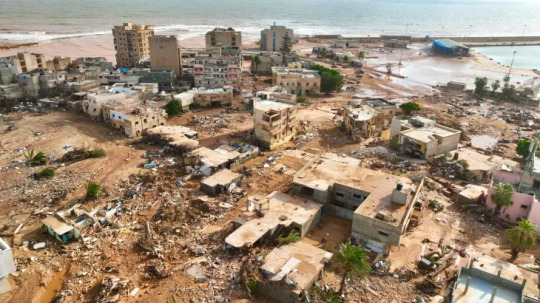
Eastern Libya, from Al Jazeera.
In the meantime, Greeks found opportunities to practice their favourite sport: political infighting. People who weren't even here when hell broke loose say that if this or that was properly done, we would not have problems at all. I even saw an idiotic Greek expat comment how "we got drowned in a little bit of rain". The truth is we should bloody thank our lucky stars and I say this with the entire awareness of half of Thessaly being currently underwater. It is true that Greek governments and people have done so many things badly, like building on top of streams and rivers, changing rivers' natural route, drying up natural lakes and all that shit that guarantees you are going to have massive problems once a serious storm breaks out. Also, the disaster revealed that there was once more a very questionable management of all the money given by the EU for anti-flooding measures after a previous flood (Ianos). Of course, I would be happy if at last we viewed this disaster as an opportunity to improve ourselves and the management of our land, however whatever happened these days wasn't the fault of anyone in particular. On the contrary, A LOT worse could have happened. A lot. Maybe Libya is not an indication because if Greece is not used to such extreme rain phenomena, then Libya is probably ten times less used to them, however we should not forget that this monster was STUCK at least five days over the heartland of Greece. For this alone we should damn be thankful we did not get it any worse and that the land endured in any way and of course now we have to correct old mistakes as well but let's do it united and determined and without wasting time once more in pointless infighting, which in this case might even be unfair. (In fact I think the thing we should blame the state the most about was not making it clear beforehand that this was going to be unprecedented, not just "very severe". They probably didn't want to cause panic and mayhem but still. We should know.) Of course I am not talking about how the state will treat the afflicted regions from now on, which is entirely its responsibility. And we should stand next to Libya. Greece has its wounds to mend but it should absolutely provide support to Libya. We know what this freak phenomenon was like.
I know this text is long but please consider reblogging this. We should know what happens on our planet. Thousands of people are dead from a freak phenomenon devastating regions across lands and seas. Also forgive any mistakes I might have made although I believe the information is correct for the most part. I didn't speak more about Libya because I don't know enough to analyze the situation as much. Perhaps there are ways of supporting the country too. As a last note, this phenomenon was not freakish because of the climate change - it was just a very unusual occurence. However, the - otherwise normal - warmth of the sea did feed and intensify the storm and the climate change might in the future cause these super rare, accidental phenomena to become more frequent.
#greece#libya#weather#climate change#storm#rainstorm#cyclone#flooding#natural disasters#world#tw death mention#world news#europe#africa#turkey#bulgaria#egypt#maps#storm daniel#greek facts#greek news#news#tw long text#tw long post#tw long#signal boost
790 notes
·
View notes
Text
“Performing sterilization without the informed consent of the person concerned is considered to be a violation of their rights,” the ministry said.
By Sarah Hurtes Sarah Hurtes reported from across Europe, including spending more than a month in Iceland.
Nov. 25, 2023, 5:00 a.m. ET
Anita cannot speak or comprehend complex information. At 28, she communicates mostly with facial expressions and baby-like sounds. When excited, she washes her hands. When her periods cause cramping and pain, she moans and agitates, unable to understand.
To eliminate this monthly discomfort and ease the burden of caring for her, caregivers at an assisted-living home in Reykjavik, Iceland, proposed an unusually aggressive step. The home’s manager recommended that Anita undergo a hysterectomy, a major surgical procedure to remove her uterus and end her periods.
Eirikur Smith, an official in Iceland’s disabilities office, discovered this plan last year during a routine visit to the home.
“Does she even know if she wants children later?” he recalls asking.
The manager, he said, was stunned. “She just laughed in my face.”
“‘Of course not,’” he said she replied. “‘Why would she ever want children?’”
Forced sterilization, with its history of racism and eugenics, is banned under multiple international treaties. Thirty-seven European nations and the European Union have ratified the Istanbul Convention, which declares, without exception, that nonconsensual sterilization is a human rights violation.
But a New York Times investigation found over a third of those countries have made exceptions, often for people that the government deems too disabled to consent. Some countries have banned the practice but not actually criminalized it. And records show that the Istanbul treaty’s official watchdog has repeatedly criticized governments for not doing enough to protect disabled people. (The United States has signed but not ratified a separate treaty on the issue and sterilization laws vary by state).
The result is that people with intellectual disabilities — mostly women — are still being sterilized, even when it is not medically necessary.
Doctors and experts believe that the practice is rare, but record-keeping is inconsistent and data is often unreliable. Iceland’s government, for one, does not keep a tally.
“So many times, you hear it’s in the best interest of the woman,” said Catalina Devandas Aguilar, a former United Nations special rapporteur for disability rights. “But often, it’s because it’s more convenient for the family or the institution that takes care of them.”
That pattern has complicated things for lawmakers and doctors. While in generations past, governments around the world sterilized disabled people as a matter of policy, today it is parents and caretakers who seek out the surgery — saying they have the women’s best interests at heart.
In Iceland this March, for example, Hermina Hreidarsdottir authorized a hysterectomy for her severely cognitively impaired 20-year-old daughter, whose periods sometimes lasted six weeks.
“I know it’s taboo, but we didn’t do it to make her infertile,” Ms. Hreidarsdottir said. “We wanted to make her feel better.”
Since 2019, Iceland has banned nonconsensual sterilization except in cases of medical necessity. But the law covers only tubal ligation, the surgical blocking of the fallopian tubes. Hysterectomies are considered medical treatment and excluded from the ban.
Neither the treaties nor most national laws address how seriously disabled women like Anita or Ms. Hreidarsdottir’s daughter could ever consent to such a surgery. United Nations standards say that caregivers should try alternative ways to communicate with severely disabled people, but experts agree that happens sporadically at best.
In France, the law allows the sterilization of people with severe mental disabilities under certain circumstances.
“When we say ‘sterilization of the disabled,’ we might sound like Nazis, but this completely ignores the diversity of disabilities, the gravity of certain disabilities, and the distress of parents,” said Ghada Hatem-Gantzer, a Paris gynecologist who sits on a regional committee that approves roughly three sterilizations annually.
Even when the law is strict, sterilization sometimes continues.
In Belgium, it is generally illegal to sterilize someone without their express consent. But one therapist, Anne Dasnoy-Sumell, said she was counseling two women with moderate intellectual disabilities who had been sterilized at their parents’ insistence recently without understanding what was happening. And Yannick Manigart, the chief obstetrician at Saint-Pierre University Hospital, said that he and his colleagues would still perform the surgery if parents request it and doctors, after consulting with hospital psychologists, deem it in a woman’s best interest.
In Iceland, Mr. Smith, whose sister has Down syndrome, was particularly frustrated with Anita’s case. Notes by his colleagues show that caregivers had not tried a hormonal intrauterine device, or IUD, which can shorten periods.
“They proposed hysterectomy without consent or conversation,” one of Mr. Smith’s colleagues wrote. A Times reporter visited Anita’s home several times, observed her and reviewed records related to her case, which refer only to her first name.
After Mr. Smith intervened, the home’s manager stopped pursuing the surgery.
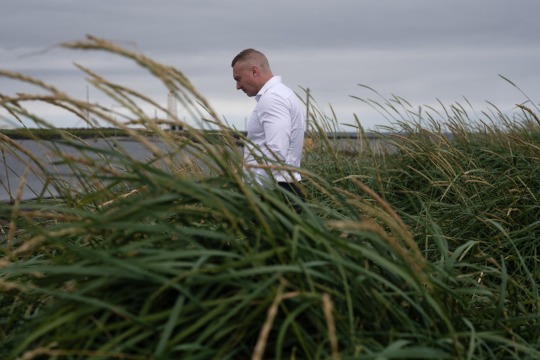
Iceland, like its Nordic neighbors, has a dark history in this area. In 1938, the country began a policy of sterilization and abortion for people its law called “feebleminded.” Such policies have long since been abandoned and Iceland is now a leading voice on human rights issues. The country’s Ministry of Health said it had tightened its sterilization laws over the years with the treaties in mind, and would continue to do so.
“Performing sterilization without the informed consent of the person concerned is considered to be a violation of their rights,” the ministry said.
Still, Mr. Smith said he had seen other cases like Anita’s recently. The hardest to spot, he said, involved parents and doctors who pressured disabled women to consent. “Not necessarily for eugenic purposes,” he said, “but still definitely to control and affect their sexual and reproductive health.”
For him, this issue is simple. A woman does not lose her human rights because she is disabled or has long periods.
But he acknowledges that he is hardly unbiased. His sister, Kristin, was sterilized at their mother’s insistence.
“She gave her written consent,” Mr. Smith said. “But she was misled.”
‘What If I Want to Have Children?’
Kristin Smith always knew she was into boys.
As a teenager in the 1990s, she sang along with the Spice Girls and fangirled over the Irish boy band Westlife. She watched “The Bold and the Beautiful” and dreamed of marrying.
She was part of a new generation. Women just a few years older recall comparing abdominal scars with classmates in special schools. Ms. Smith was among Iceland’s first students with Down syndrome to graduate from a mainstream high school — the same one as her older brother.
But she remembers feeling under near-constant surveillance by her mother. Ms. Smith’s mother declined to be interviewed.
At age 20, Ms. Smith said, her mother arranged for her to receive a tubal ligation. “I told my mom, ‘What if I want to have children later?’” Ms. Smith recalled. “But she said no. It would be too difficult.”
It is rare for people with Down syndrome to become parents, and their children have an increased chance of having the condition themselves.
Any talk of children, though, was theoretical. Ms. Smith had never even had a boyfriend. She consented to the surgery.
Ms. Smith remembers her mother taking her to the hospital. The doctor explained that she would be unable to have children. Then came medicine to make her sleepy.
Her mother assured her that this was for the best. And sometimes, even now, Ms. Smith agrees. “It’s a good thing,” she said. “I feel fine about it.”
‘This Is What Is So Horrible’
Mr. Smith joined Iceland’s Disability Rights Protection Office in 2016. Though Iceland had signed a pair of treaties that banned nonconsensual sterilization, neither had been ratified and the law still allowed it for the mentally ill.
Iceland’s health ministry even ran a committee that approved requests from parents, which has not previously been reported. The ministry says it kept no records on how many sterilizations occurred this way. But a spokesman for Landspitali, Iceland’s largest hospital, said that between 2013 and 2017, the committee approved the sterilization of six teenage girls.
“This is what is so horrible: I never met any of the children who would be sterilized. Never,” said Anna Sigrun, a former hospital social worker who said she was ashamed to have recommended cases to the committee.
The committee disbanded in 2019 after Iceland banned nonconsensual tubal ligations. But sterilization cases continued to pop up in Mr. Smith’s office.
Less than a year after the ban was passed, his unit intervened on behalf of an 18-year-old girl with severe cognitive impairment. Her foster mother, with the support of government social workers, sought a hysterectomy to manage her periods. Mr. Smith said the surgery was simply a way to ease the burden of care.
“They reasoned that she would be easier to handle afterward,” he said. The surgery did not go forward.
‘The Best Medical Treatment’
Hermina Hreidarsdottir’s fourth child, a girl, was born with six fingers on her right hand and a pointy, almost elfish left ear. One eye was a lighter shade of blue than the other, but she otherwise seemed healthy.
After a few months, though, Ms. Hreidarsdottir (pronounced RAY-thars-DOH-tair) realized that her daughter had trouble seeing. Doctors said she might be blind in one eye.
“I knew something was not normal,” she said. She welcomed a reporter into her home to meet her daughter, but asked that she not be named.
Finally, at about 8 months old, the girl was diagnosed with two rare genetic disorders. For the rest of her life, doctors said, she would see in only two dimensions and would probably struggle to speak and understand.
With no special-education programs nearby, Ms. Hreidarsdottir placed her daughter in a mainstream school. She dreaded her daughter’s first period. “I knew she wouldn't handle it well,” Ms. Hreidarsdottir said.
At 11, her daughter started menstruating, sometimes for weeks. Confused, she would sometimes remove her pad, then bleed in class, her mother said. Her doctor says she has the mental capacity of a 4-year-old.
Ms. Hreidarsdottir said she tried hormonal injections, but struggled to give her daughter a shot every three months. An IUD failed to shorten the periods.
Dr. Alexander Smarason, the young woman’s longtime doctor, concluded that because she could neither understand nor manage her periods, a hysterectomy would be in her best interest.
“That’s just giving her the best medical treatment possible for her quality of life,” he said. “We cannot deny her that right.”
Ms. Hreidarsdottir said she also knew that disabled women face increased risks of sexual assault, and she feared an unwanted pregnancy. At 56, she could not care for another child and knew her daughter would never be able to.
Decisions like these, involving people who almost certainly cannot give express consent, hang over the sterilization debate. Katrin Langensiepen, a German politician and one of the few visibly disabled members of the European Parliament, is pushing for a strict Europewide ban on nonconsensual sterilization. Many of history’s notorious eugenics practices, she said, were justified as being in a disabled person’s best interest.
But she acknowledged that some parents saw things differently. “They have the deep, strong belief: I need to protect my children,” she said.
At 20, Ms. Hreidarsdottir’s daughter has soft eyes and a knack for puzzles. She loves audiobooks. In March, her mother explained that she would go to sleep and have an operation to feel better.
“I don’t think she understood,” Ms. Hreidarsdottir said. “But we always try to explain things.”
True Love
Even after her surgery, Ms. Smith kept dreaming of romance. She considered trying dating apps, but in every potential profile picture of herself, all she saw was someone with Down syndrome.
Every summer, she attended a camp for adults with disabilities. During those Icelandic nights, under vast skies that never went dark, she hiked, sang karaoke and mingled outside her mother’s gaze. “I felt free,” she said.
There, during the summer of 2020, she met Sigurdur Haukur Vilhjalmsson, who also has Down syndrome. They both liked pop songs and soccer. He was charming and had a silly streak, a contrast to her more serious personality. He made her laugh.
At age 38, she had found love.
The following Christmas, on the beach in Tenerife, Spain, Mr. Vilhjalmsson knelt in the sand and proposed.
They now live together in Husavik, a town on Iceland’s northern coast. They share a cozy one-bedroom apartment in a building for people with disabilities. Their baby pictures hang in the living room.
Some residents need lots of help. Ms. Smith and Mr. Vilhjalmsson are the building’s most independent tenants and its only couple. She washes dishes in a restaurant. He works in a hospital kitchen.
They enjoy road trips, cooking and music. Mr. Vilhjalmsson plays the drums. Ms. Smith serenades him with “Husavik (My Hometown),” a song from the Will Ferrell movie “Eurovision Song Contest.”
They’re picking a wedding date. On Sundays, they walk hand in hand around the port. They talk about their future.
Mr. Vilhjalmsson wants children. Ms. Smith has spent years saying that she never did, that her mother’s decision was for the best. Now the conversation is less abstract.
Does she want to be a mother?
“I wanted to,” she said.
Her eyes welled. She paused, composing herself.
“I still want to.”
#Europe#Women with disabilities#forced sterilization#Istanbul Convention#nonconsensual sterilization is a human rights violation.#over a third of those countries have made exceptions#Iceland’s Disability Rights Protection Office
5 notes
·
View notes
Text
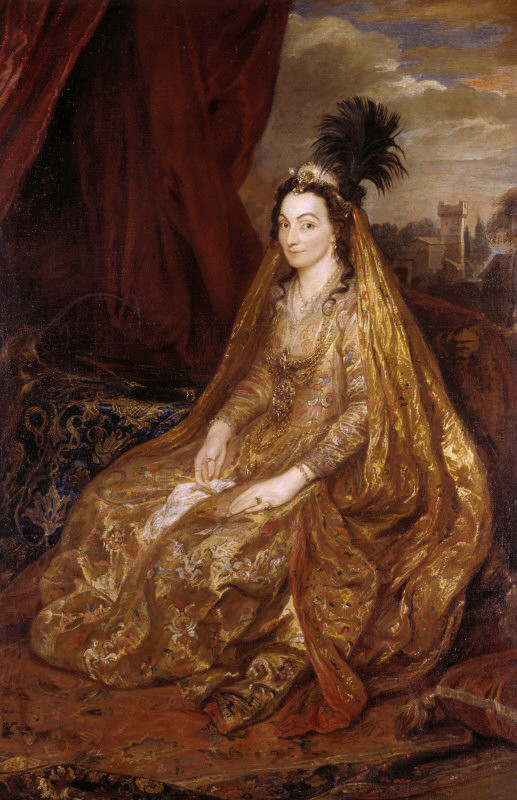
Teresa, or Teresia Sampsonia, Lady Shirley (1589–1668)
Artist: Sir Anthony Van Dyck (Flemish, 1599-1641)
Date: 1622
Medium: Oil on canvas
Collection: National Trust Collections, United Kingdom
Description
Teresa Sampsonia (born Sampsonia; after marriage Lady Shirley, 1589–1668) was an Iranian-English noblewoman of the Safavid Empire of Iran. She was the wife of Elizabethan English adventurer Robert Shirley, whom she accompanied on his travels and embassies across Europe in the name of the Safavid King (Shah) Abbas the Great.
Teresa was received by many of the royal houses of Europe, such as English prince Henry Frederick and Queen Anne (her child's godparents) and contemporary writers and artists such as Thomas Herbert and Anthony van Dyck. Herbert considered Robert Shirley "the greatest Traveller of his time", but admired the "undaunted Lady Teresa" even more. Following the death of her husband from dysentery in 1628, and due to impediments from grandees at the court, and the authorities, during the reign of Abbas's successor and grandson Safi (r. 1629–1642), Teresa decided to leave Iran. She lived in a convent in Rome for the rest of her life, devoting her time to charity and religion. As a pious Christian, and because of her love for her husband, Teresa had Shirley's remains transported to Rome from Isfahan and reburied; on the headstone of their mutual grave she mentions their travels and refers to her noble Circassian origins.
Thanks to her exploits, Teresa has been described as someone who subverted patriarchal gender roles common to the Muslim and Christian cultures of her time. Due to their hybrid identities and adventures, Teresa and her husband became the subject of several contemporary literary and visual works. Nevertheless, the story of Teresa as an important woman of the 17th century has been largely overshadowed and obscured by the tale of her husband Robert and his brothers.
Together they made two extended voyages across Europe. In 1611 they travelled to England where Teresa gave birth to their son, Henry. In 1613 they returned to Isfahan on an East India Company ship. The Shirleys continued to travel over the next decade to India, Portugal, Spain and Italy. They went to Rome in 1622, and this picture and the pendant portrait of Robert can be dated to Van Dyck's first visit to the city.
Van Dyck’s training with Rubens had sharpened his eye for the enriching effect offered by sumptuous garments such as those worn by Lady Shirley. Van Dyck had also recently begun to absorb the lessons of Titian and the other great Venetian colourists.
Teresa was a gifted linguist and spoke more than half a dozen languages. Historian Bernadette Andrea recounts how she saved her husband’s life on at least two occasions: ‘once as they set off on their first journey when his Persian enemies sought to kill him, which earned her the accolade "a true Amazon" and again when the couple encountered hostile Portuguese traders on their way to Goa.’ (See the entry for 'Lady Teresa Sampsonia Sherley' in the Oxford Dictionary of National Biography).
After Robert’s death, Teresa was accused of the capital crime of apostasy and her property was confiscated. She became a fugitive, hiding in an Augustinian church in Isfahan and an Armenian convent just outside the Safavid capital. She received a special permit to travel, went to Istanbul for three years and then on to Rome where she settled and remained for more than three decades until her death in 1668.
#portrait#teresa sampsonia#safavid empire of iran#golden dress#persian rug#seated#veil#jewels#iranian noblewoman#oil on canvas#artwork#fine art#oil painting#iranian history#anthony van dyck#flemish painter#national trust collections#flemish art#17th century painting#european art
28 notes
·
View notes
Text
just please give it a minute and read this‼️🚨
Hey guys i know this is goint to be different than my usual content but i always speak up or do whatever i can to help people all around the world. And I want your help this time.
This might be triggering for some people and i'm sorry in advance but please read the whole thing and help me raise my voice and the women of my country's to make this matter known so that the government would start taking us seriously and start taking measures for women's safety.
I’m Turkish and I live in Turkey. I couldn’t be more proud to be Turkish but the government (which they’ve been on power for like 25 years) destroyed our country by doing everything they can. No people in Turkey has a safety right now especially women and children. Why am I telling you all of this? Because they’re releasing the criminals and corrupted our legal and justice system. For the couple of days a woman sexually assaulted by two men and caught by cameras and they released them. But after people started to post this in X they put them in jail back. We’re trying to make justice from social media.
Yesterday, 2 women were brutally murdered by the same man at Edirnekapı, Istanbul. The murderer first killed Ayşenur (19) in his home and called the cops to report the murder then, he went to kill İkbal (19). Semih Çelik murdered those two 19 YEAR OLD girls, İkbal Uzuner and Ayşenur Halil. He slit Ayşenur's throat and dismembered İkbal Uzuner on top of the city walls and he THREW İKBAL'S HEAD IN FRONT OF HER MOTHER. He then committed suicide by jumping from the very same place he dismembered İkbal. And he did all this IN BROAD DAYLIGHT.
He had been stalking İkbal for over a year, his own father had reported him several times, a disturbing drawing made by him and a video of him filmed last year talking about how he wanted to kill İkbal (quoting the exact words from the video: "...The day you saw me, I had come to kill you. I wanted to take a life with me when I left this life, and it was more valuable for me if that person was you. To cut out your heart, your eyes…") were uncovered recently but NO MEASURES WERE TAKEN. That psychopath took two innocent lives and the only thing that the government did was to impose a broadcast ban.
So as a woman who is afraid, i am asking you to spread this and to make this known. We, turkish women, hope that making this matter known globally will help us.
This hashtag #turkishwomenareindanger is also used in X and if you want to see what have been going through for the years you can look up to it and please look up.
The things I’m trying say this with all of that. There’s no justice in our country. There are very dangerous and a lot of groups that hating women and trying to normalize this. I’m talking about normalizing RAPE/CHILD PORN/WOMEN HOMOCIDES/ THREATS/BLACKMAIL/ VIOLENCE and everything related to them.
Why do we need help to raise our voices?
>In 2021, Turkey became the first and only country to withdraw from the Istanbul Convention, a human rights treaty of the Council of Europe opposing violence against women.
>Women's complaints are not taken seriously, and offenders are repeatedly let go without any consequences. Our prisons are filled to the brim with journalists and political prisoners, however repeat sexual offenders, abusers, p3d0philes and murderers are released.
So this means, even if that murderer did not commit suicide he might've not been punished properly for his crimes.
The images below are the details.
the images and some paragraphs i took from @thhestia






33 notes
·
View notes
Text
Bulgaria’s parliament on Wednesday adopted a law which prohibits “propaganda” for “non-traditional sexual orientations” in schools, sparking outrage and calls for protests.
The legislation was drafted by the pro-Russian Revival party, but on its first and second readings it also gained support also from pro-Western factions as well.
The amendment to the Law for Pre-School and School Education outlaws “propaganda, popularisation and encouragement, directly or indirectly, of ideas and views connected to nontraditional sexual orientation or to gender-identifying different from the biological”.
In total, 135 out of 240 MPs voted in favour. Support from the pro-Moscow Bulgarian Socialist Party was expected, but the bill passed largely because of the surprising backing of the pro-EU centre-right GERB party.
More than half of the MP’s from the reformist opposition duo We Continue the Change/Democratic Bulgaria missed voting on the first reading for unclear reasons, but the alliance participated more fully on the second, voting against. Altogether, 57 MPs voted against and eight from GERB abstained.
The increased presence of topics related to sexual and gender identity in Bulgaria’s educational system is mentioned as a fact in the legislation’s wording, without offering specific examples. Some MPs cited the existence of brochures on sexual education for children and teenagers, or translated books that are in circulation, as problematic.
The text does not mention sanctions and does not specify what “ideas and views” would be considered unlawful, leaving room for various interpretations.
“The restriction on even talking about the topic in school limits chances to oppose the violence and harassment that LGBTI+ students experience,” the feminist organisation LevFem said after the passage of the amendment.
LGBTQ+ organisation Deystvie drew direct comparisons between the draft amendment and the steady limitation of human rights and the rights of sexual minorities in Russia. “For the 30 years of democratic transition, Bulgaria’s political elite never understood that human rights are at the core of democracy,” Deystvie stated.
“We need to be heard and understood, not rejected and attacked,” the human rights collective Feminist Mobilisations said before the vote.
On Wednesday afternoon, a protest was announced in Sofia.
Echoes of hate speech in debates
During the parliamentary debate, some politicians made statements bordering on hate speech.
Socialist Party leader Kornelia Ninova said that Bulgarian families abroad had contacted her to alert about the dangers of “gender ideology” in the West and criticised those who are “one thing in the morning, a second in the afternoon, a third in the evening”.
Ninova defined “gender ideology” as something promoted “by very influential and rich people” and said it was “creeping into and taking over Bulgarian schools”.
She noted the recent Eurovision Song Contest, won by a non-binary contestant, and the aesthetics of the opening ceremony of the Olympic Games in Paris as worrying examples. Olympic controversies have been fanned by local conservative politicians, as a recent BIRN analysis explained.
Ninova’s statements are in line with pro-Kremlin leanings of the Socialist Party, which in 2023 tried to initiate a referendum against “gender ideology” and which since 2017 has vehemently opposed the women’s rights treaty, the so-called Istanbul Convention, interpreting it as promoting LGBTQ+ rights.
“I’ll repeat what I’ve been saying for seven years now: hands off Bulgarian children,” Ninova said on Wednesday.
Zvezdelina Karavelova of Revival said that “pederasty” should be challenged and she hoped that her one-year-old son would never bring home a husband.
Atanas Tchorbanov of the There’s Such a People party compared the outcry from human rights organisations to the orchestra that famously played on during the sinking of the Titanic.
Daniel Mitov of GERB said the measure was an opportunity to fight “leftist ideologies”.
In contrast, Eleonora Belobradova of We Continue the Change criticised the amendment as regressive and claimed that some paragraphs had been copy-pasted from Wikipedia.
The turn of events underscores the successful politics of Revival. Between 2020 and 2022, support for the party increased after it adopted anti-vaxx positions during the COVID-19 pandemic and stayed close to the Kremlin playbook over Ukraine.
In 2022, Revival unsuccessfully tried to bring in a Russian-style “foreign agents” law.
20 notes
·
View notes
Text
16 notes
·
View notes
Text

emmawatson: 🆘 With the awareness generated by #metoo, there is an increased demand for support services as more people are emboldened to name what happened to them.❣️Rape Crisis Centres❣️offer much-needed support to people who have been assaulted across England and Wales (@rapecrisisew), but demand way outstrips supply.❗️This time last year, there were 6,355 survivors on Rape Crisis waiting lists and these can be as long as 14 months.‼️ This means that if a survivor calls to look for support they may be turned away… ⠀⠀⠀⠀⠀⠀⠀⠀⠀ ⌛️💷 Successive UK governments have failed to fund life-saving services. There are just 44 Rape Crisis Centres in England and Wales. 🎯 But the Istanbul Convention (which our Government will soon ratify) sets out a minimum provision of support for victims of rape which would require that there be 150 Rape Crisis Centres in England and Wales. 🚨 It’s simply unacceptable that a country like mine falls so far short of the minimum standards set across Europe. ⠀⠀⠀⠀⠀⠀⠀⠀⠀ 📋❤️✍🏻 So on #IWD2019, I encourage you to sign Fern’s petition 👆🏻LINK IN BIO👆🏻and demand that Theresa May guarantees sustained 💰 funding for rape crisis support services, 💌 so the survivors of sexual violence can access the support they need. ⠀⠀⠀⠀⠀⠀⠀⠀⠀ 🔗📋✍🏻 tinyurl.com/FernsPetition ⠀⠀⠀⠀⠀⠀⠀⠀⠀ 💪🏻👩🏼 These are the words of 25-year-old Fern Champion, who was raped in 2016 and has launched a petition 💌 asking the Prime Minister to ensure that specialist rape counselling support is always available for everyone who seeks it: ⠀⠀⠀⠀⠀⠀⠀⠀⠀ 🤲🏻 💔 “By not adequately funding support services this Government is telling survivors that their recovery does not matter and by extension that they do not matter. When you have been raped, the vital, life-saving counselling should just be there when you need it.” 🙌🏻❤️👏🏻 ⠀⠀⠀⠀⠀⠀⠀⠀⠀ ☎️ RAPE CRISIS NATIONAL HELPLINE: 0808 802 9999 (rapecrisis.org.uk)
15 notes
·
View notes
Text
An Iranian LGBTIQ activist is facing deportation to his home country. The Human Rights Association (IHD) announced on Friday that Elyas Torabiba-Eskandari was detained last Sunday at a Pride parade in Istanbul and taken into deportation custody. After a stay of several hours at the police station in the Beyoğlu district, Torabiba-Eskandari was initially taken to the deportation centre of the Turkish migration authority in Tuzla. In the meantime, he is being held in an identical facility in the border province of Urfa. Elyas Torabiba-Eskandari fled Iran ten years ago together with his mother. According to the IHD, both were victims of state violence, arbitrary detention and torture in their home country. Since their flight in 2013, they have been living in Turkey - however, they do not enjoy full refugee protection there in the sense of the Geneva Convention, but only have so-called conditional refugee status. Nevertheless, a deportation would violate the prohibition of refoulement, i.e. that refugees may not be deported to countries where their lives are in danger. However, the IHD regularly documents deportations of refugees from Turkey to Iran, but also to Syria and Iraq, where their lives are in danger.
LGBTQ+ activists face lethal punishments in Iran. This shouldn't be allowed.
#tw homophobia#tw queerphobia#human rights#politics#lgbtq+#middle east#iran#queer rights#turkyie#turkish politics#refugee crisis#refugee rights
109 notes
·
View notes
Text
Doing a big batch cook for the week with my housemates this weekend (pineapple peanut stew; chana masala; cabbage Parmesan; red curry with eggplant and tofu).
I've been listening to my 12 Days of Christmas playlist. It is mostly not Christmas music. Instead, it starts with one song about a pear tree, then two songs about doves, then three about chickens, then four about colly (coal-black) birds, five about gold rings, etc. I had to get all the way to geese before I hit a song that I'm "meh" about ("Surrey with the Fringe on Top"-- if you have another suggestion of a song with a goose in it, let me know!).
Anyway: thank you past self, this is hitting the spot. Full list below if you're curious! All of it's on YouTube.
Pear tree: Olya Fryz, "Posadzhu Ya Hrushechku (Pear Tree)" Turtle doves: Jess Klein, "Little White Dove" Prince, "When Doves Cry" French hens: Mussorgsky, "Ballet of the Unhatched Chickens" from Pictures at an Exhibition Fairport Convention, "The Hen's March Through the Midden" Louis Jordan, "Ain't Nobody Here but us Chickens" Colly birds: Beatles, "Blackbird" XTC, "Rook" Alan Parson Project, "The Raven" Arthur Baynon, "When Rooks Fly Homeward" Gold rings: Beyoncé, "Single Ladies" Boiled in Lead, "Step it Out, Mary" Leah Jenea, "Gold Ring" Kimbra, "Plain Gold Ring" (both this and previous are riffs on Nina Simone's "Plain Gold Ring") Emmylou Harris, "Golden Ring" Geese a-laying: Rodgers & Hammerstein, "Surrey with the Fringe on Top" Pigpen Theatre, "Goose Song" Kate Rusby, "The Wild Goose" Debussy, Prelude Book 1 L 117, arranged by Dan Golding for Untitled Goose Game Jethro Tull, "Mother Goose" Ravel, "The Fairy Garden" from Mother Goose Suite Swans a-swimming: Carl Orff, "Burning Swan" from Carmina Burana Camille St. Saens, "The Swan" Tchaikovsky, "Dance of the Little Swans" from Swan Lake Dua Lipa, "Swan Song" BTS, "Black Swan" Loreena McKennitt, "The Bonny Swans" Jean Sibelius, Movement 3 of Symphony 5 (I vaguely remember reading that Sibelius was inspired by seeing swans in flight, if I'm wrong I'm wrong) Maids a-milking: Three Gaelic milking songs performed by Kate Nicholson The Longest Johns, "The Milkmaid" The Red Krayola, "Dairymaid's Lament" Donatan ft. Cleo, "My Slowiaenie" Heather Breeze, "The Dairymaid" Paddy Roberts, "Poor Little Country Girl" Sean Maguire, "The Dairymaid" R. Langgaard, "Saeterjenten" (Dairymaid) Ladies dancing: Dua Lipa, "New Rules" Boston College Dance Ensemble dancing to "Hallelujah" Sasha dances to "Istanbul, not Constantinople" on Bunheads Ballet sequence from The Red Shoes "Cell Block Tango" Beyond Words Dance Company dancing to "Closer to Fine" Fourth and final part of Martha Graham's "Appalachian Spring" "Canned Heat" from Center Stage Beyoncé, "Formation" John Gardner, "Tomorrow Shall be my Dancing Day" Lords a-leaping: Alvin Ailey Dance Ensemble, "Sinnerman" Kriss Kross, "Jump" "Candy Canes" from Balanchine Nutcracker "Candy Canes" from Debby Allen's Hot Chocolate Nutcracker Donald O'Connor, "Make 'em Laugh" from Singing in the Rain Gregory Hines and Mikhail Baryshnikov, Duo Dance from White Nights Turf Feinz soloists No Noiz, Man, BJ, and Dreal dancing to music by Yung FX, Erk tha Jerk, and COOP Virsky Hopak soloists of the Ukrainian Dance Company Alvin Ailey Dance Ensemble, "EN" Pipers piping: Medieval Baebes, "Old King Cole" The Rogues, "Gravel Walk" Big Country, "In a Big Country" (yeah I know it's actually guitar, but it's the best pipe approximation I've ever heard from guitars) Migos, "Pipe it Up" "Scotland the Brave" Loreena McKennitt, "Mummer's Dance" Paul McCartney, "Pipes of Peace" (also "meh" on this one) "Toss the Feathers" and "The Bunch of Keys" Pointer Sisters, "Banging on the Pipes / Steam Heat" Pipe Guy (Adelaide) playing a 10-minute house / trance / techno set on PVC tubes Charles Widor, "Toccata" Drummers drumming (okay, this is where the actual Christmas music disproportionately comes in): "Patapan" Sally Avant, "Reel Around the Sun" Leslie Odom Jr, "Little Drummer Boy" Morehouse College Glee Club, "Betelehemu" Bindley Benjamin, "Parang Soca" Chieftains / Elvis Costello, "St Stephen's Day Murders" Christopher Tin, "Baba Yetu" Arlindo Cruz, "Natal Diferente" XTC, "Stupidly Happy" Kwadwo Donkor, "Afehyia Pa" Duke Ellington / Tchaikovsky, "Danse of the Floreadores"
6 notes
·
View notes
Text

— no one mourns the wicked.
playlist — pinterest
— INFO: Name: Serkan Bayındır DOB/Sign: March 22, 1993/Aries Hometown: İstanbul, Türkiye Affiliation: Castenada Family- Mercenary Occupation: Owner of the Velvet Lounge Neighborhood: The Flats Positive Traits: Resilient, loyal, charismatic, protective Negative Traits: Impulsive, guarded, stubborn, impatient Myers-Briggs: ESTP Alignment: Chaotic Neutral Likes: Boxing, thunderstorms, fixing things, coffee, concocting new drinks, late nights, live music, playing guitar Dislikes: Hospitals, snow, anything grape flavored,
— BACKGROUND: Born to a tight-knit, yet complicated family in İstanbul, Türkiye, Serkan has always understood the meaning of loyalty, as well as how fiercely it must be upheld. His upbringing was far from conventional, with his father a well respected presence within İstanbul’s criminal underground and his mother an innocent bystander, but Serkan and his younger brother, Kerem, never knew that. To them, the violence and chaos was practically woven into the fabric of who they were. It was normal, even if it never should have been. From a young age, both brothers found themselves subconsciously following their father’s lead, much to the chagrin of their mother, who’d hoped her boys might choose a different path. But they were their father’s sons, armed with restless, fiery spirits and a relentless drive, and their mother could see it. Neither of them would ever play it safe with a typical nine to five livelihood. No, they’d chase each thrill as it came to them, same as their father.
When Serkan was ten years old, his father’s endeavors with black market arms dealing uprooted the Bayındır family and relocated them to Devil’s Junction, Illinois. At the time, Serkan was largely unaware of what his father’s dealings with the Castenada family truly meant, but his father’s loyalty to them was never lost on him. Over the next few years, his father continued to work closely with the Castenada family, participating in one gun deal after the other up until his untimely death when Serkan was fourteen. Stricken with grief, his mother pinned his father’s death directly on his business relations and hoped it might deter her sons from that life, but if anything, his death only served as a catalyst. Balancing his family on his shoulders in the wake of his father’s passing, Serkan dove in deep, curbing his grief by beating it into something that he could use. In the years that followed, he honed himself into an asset for the Castenada family, into a weapon that could be used by the organization that his father had given his life for. If that put him in the crossfire just like his father, then so be it– wasn’t that loyalty, after all? Since he was twenty years old, he’s been a hired gun for the Castenadas. While very close to his brother, his work has certainly strained his relationship with his mother, though they’re still very present in each other’s lives. Despite his mother’s objections, Serkan strives for loyalty to both his given family and his chosen family, the Castenadas. About a year ago, he acquired the Velvet Lounge, both to pursue his own interests and to potentially set it up as a spot for the family to use if needed. — HEADCANONS:
Serkan lives for the fast life, whether that be through muscle cars or motorcycles, and enjoys fixing them up in his spare time.
He’s an avid boxer and mixed martial artist. It’s stress relief for him and a way to stay sharp and in shape.
A bit of a mixologist– he loves concocting new drinks
Fluent in three languages: Turkish, English, Spanish
Has a new kitten– a little gray girl named Mey. He found her abandoned in a dumpster outside of the Velvet Lounge and she’s become his entire world.
— CONNECTIONS:
Friends: Though it's a bit hard for him to connect sometimes, he's loyal to a fault, so I'd love some ride or die friends for him. Once he's befriended you, he's a friend for life.
Employees: I love work relationships, so would love to have any of his employees whether it be a bartender, waitress, security, etc. I'm here for all of it.
Sparring partner: He loves to box. Fighting keeps him grounded and centered, so he'd most likely rely on this person a lot to randomly meet him in the ring and just help him sort out whatever is going on in his head.
Brother: Would looove to see his brother, Kerem, in play. The two of them are thick as thieves and always have been.
Enemies: Always down for some conflict. He's having a bit of a hard time adjusting to uniting against a common enemy, particularly because his father was likely killed by one of the other families, so old habits tend to die hard.
Fwbs: He's not been much of a commitment man in recent years, preferring to keep most everyone at arms length, but he still longs for connection.
Exes: Definitely open to this. I like the idea that he's had a "one that got away" situation, etc.
4 notes
·
View notes